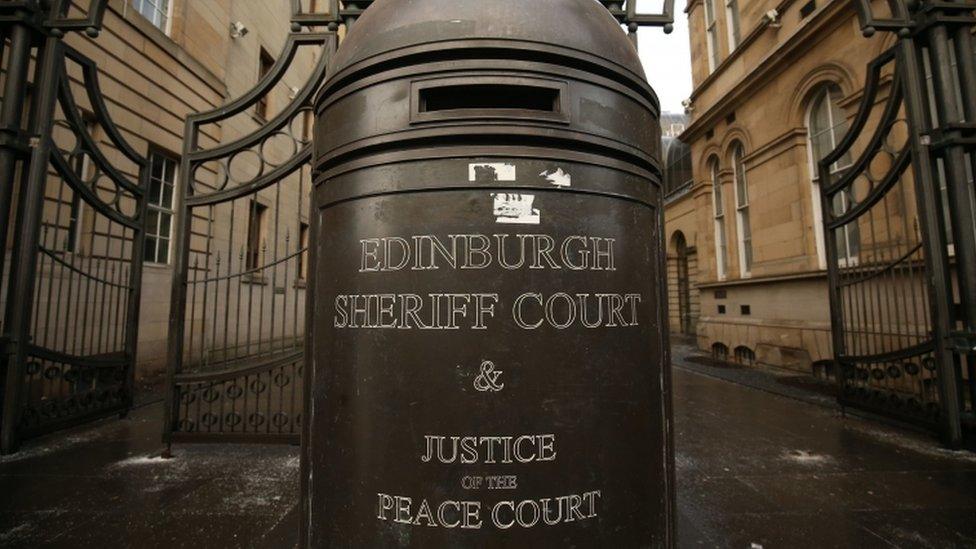Alex Salmond court case: What will happen next?
- Published

Mr Salmond has been charged with a total of 14 offences
The arrest and subsequent court appearance by former first minister Alex Salmond on charges including attempted rape and sexual assault have sent shockwaves through Scottish - and British - politics.
For journalists used to covering Scottish courts, the case has followed standard procedures that remain exactly the same regardless of who the accused is.
But for people with little or no experience of the Scottish legal system, which is very different from the one in England, some of what has - and has not - been reported might seem a bit strange.
Here's an explanation of what has happened so far, what is likely to happen next - and why the media is now not able to go into as much detail about the case as you might expect.
What has happened so far?
Mr Salmond was arrested by officers from Police Scotland after voluntarily attending a police station on Wednesday. He was formally charged with a total of 14 offences - two attempted rapes, nine sexual assaults, two indecent assaults and a breach of the peace.
The former SNP leader was released on bail by the police after his arrest, before appearing at Edinburgh Sheriff Court on Thursday afternoon.
Because the allegations against him are so serious, and could carry a lengthy prison sentence if he is convicted, the case is being dealt with through what is known as solemn procedure.
As with all solemn cases, Mr Salmond's first court appearance was held in private - with only Mr Salmond, his lawyer, the Sheriff, prosecutors and court officials allowed to attend.
Mr Salmond told reporters outside court that he was "innocent of any criminality whatsoever"
A legal document known as a petition which outlines the charges against Mr Salmond was read to him.
Mr Salmond made no plea during the hearing, which is again completely standard procedure in solemn cases and he was not asked whether he was pleading guilty or not guilty.
After being granted bail by the sheriff, Mr Salmond told reporters outside the court that he is "innocent of any criminality" and would defend himself "to the utmost" during the case.
As with all solemn cases, details of the petition were given to the media after the hearing and can be reported.
What is likely to happen next?
No date has yet been fixed for the next hearing in the case, but any trial - which for attempted rape cases would generally be held before a judge and jury at the High Court - should start within the next 12 months. In reality, however, trials are often delayed and start more than a year later.
In the meantime, prosecutors and Mr Salmond's legal team will continue to prepare their respective cases and it is possible that some or all of the charges against him will change, or even be dropped completely.
At some point over the next few months, an indictment will be served on Mr Salmond, which details the charges on which he would stand trial.
Dates will also be set for a trial and a preliminary hearing. The preliminary hearing must be held at least 29 days after the indictment is served, and is essentially a pre-trial hearing.

An accused person's first appearance under solemn procedure will almost always be at a sheriff court
At this point, Mr Salmond will be asked for the first time whether he is pleading guilty or not guilty.
If the plea is not guilty, both the Crown and defence lawyers will give details of their case to the court, including how many witnesses they intend to call, how long the trial would be expected to last and whether any special defences - such as alibi, incrimination or self defence - are being lodged.
If both sides have fully prepared their cases, it can proceed to the trial date. Alternatively, more preliminary hearings can be held to allow them to update the court on their progress.
Juries in Scotland have 15 members of the public sitting on them. After hearing evidence from both the Crown and the defence, the jury reaches a verdict of guilty, not guilty or not proven either unanimously or by a majority.
The not proven verdict is a unique - and highly controversial - feature of the Scottish legal system, and you can read more about it here.
What can people say about the case now?
As soon as someone is arrested in Scotland, strict rules come into force which severely limit what the media is able to say about the case.
In effect, this means that journalists are able to report the name of the accused and the charges they face - but cannot go into detail about the background to the case, the evidence that might be heard or the possible outcome.
Allow X content?
This article contains content provided by X. We ask for your permission before anything is loaded, as they may be using cookies and other technologies. You may want to read X’s cookie policy, external and privacy policy, external before accepting. To view this content choose ‘accept and continue’.
Allow X content?
This article contains content provided by X. We ask for your permission before anything is loaded, as they may be using cookies and other technologies. You may want to read X’s cookie policy, external and privacy policy, external before accepting. To view this content choose ‘accept and continue’.
Allow X content?
This article contains content provided by X. We ask for your permission before anything is loaded, as they may be using cookies and other technologies. You may want to read X’s cookie policy, external and privacy policy, external before accepting. To view this content choose ‘accept and continue’.
These Contempt of Court laws tend to be more strictly adhered to in Scotland than they are elsewhere in the UK, and are designed to ensure that the accused - no matter who they are - is able to receive a fair trial without jurors being swayed by media speculation.
This is particularly tricky for a high-profile figure such as Mr Salmond, and the Crown Office has stressed that the contempt laws also apply to social media and blogs - meaning anyone who tweets or posts anything that could potentially prejudice the case could face prosecution.
Anyone found guilty of contempt can be jailed for up to two years, or face a heavy fine.
The media will also never identify the alleged victims in any case involving sexual offences unless those victims waive their right to anonymity.